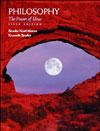* David Hume's empiricist theory of knowledge. * Hume's metaphysical skepticism (or "why Hume's theory of knowledge makes most claims about reality unknowable."). * Immanuel Kant's theory of knowledge. * how Kant's epistemology restores many of the claims Hume said we couldn't know. * why Kant is still a skeptic concerning claims about how things really are, independent of experience. * how Georg Wilhelm Friedrich Hegel turns Kant 's skepticism into the all-embracing metaphysics of absolute idealism. * the continental reactions to Hegel's "System" from Soren Kierkegaard, Arthur Schopenhauer, Sigmund Freud, and Friedrich Nietzsche. | 


 2002 McGraw-Hill Higher Education
2002 McGraw-Hill Higher Education